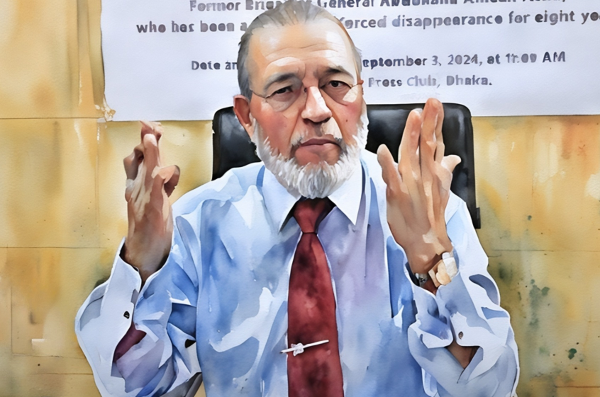Brigadier Azmi’s call for a National Anthem change and our deep-rooted bigotry and indoctrination

When Brigadier General (suspended) Abdullahi Aman Azmi called for the creation of a new national anthem during a press conference on Tuesday, arguing that the current anthem violates the spirit of independent Bangladesh, it sparked more than just a storm in a teacup.
It highlighted the deep-seated bigotry and cultural divisions that persist in post-revolutionary Bangladesh.
Azmi had recently been released from an illegal detention facility operated by the country’s military intelligence, which had been under the direct influence of the ousted dictator Sheikh Hasina.
His release came only after Hasina’s government was overthrown by a massive student-led uprising.
During the press conference, Azmi recounted his harrowing experiences in the secret prison known as Aynaghar—the House of Mirrors. He was visibly moved as he described the constant fear of becoming a victim of "crossfire" during his eight-year ordeal.
He then discussed the number of martyrs from the 1971 liberation war, stating that he believed it could not have been more than 300,000. He also proposed fundamental changes to the constitution and suggested altering the national anthem.
National anthems are powerful symbols of a country's identity, often reflecting a nation's reckoning with its past and its aspirations for change. Beyond their melodies and lyrics, they embody a nation’s history, culture, and values.
Brigadier Azmi’s proposal to change the national anthem understandably sparked controversy and backlash.
However, the intensity of the opposition revealed a deeper issue of ingrained bigotry and cultural fascism among a large segment of the population, which resulted from years of faulty and problematic indoctrination.

Subscribing to a troubled narrative
Azmi is the son of Ghulam Azam, the former Amir of Jamaat-e-Islami in Bangladesh, who was prosecuted for war crimes by the controversial tribunal established by the Hasina administration.
While Azam's role against Bangladesh's independence is well-documented, Azmi, a highly decorated military officer in independent Bangladesh, has neither had any known affiliation with his father’s party nor promoted any anti-Bangladesh views.
However, in Hasina's deeply polarized Bangladesh, where the political narrative has been sharply divided between pro-liberation and anti-liberation camps for her own political gain, Azmi has been perceived as the son of a "war criminal" who must share anti-Bangladeshi sentiments, despite his distinguished military service.
Australia-based Bangladeshi researcher Mubashar Hasan highlighted in a Facebook post that while people have every right to protest Azmi's suggestions—just as Azmi has the right to propose changes to the national anthem—many are employing a condescending logic.
This logic assumes that because Azmi's father was a Razakar (collaborator or traitor), Azmi himself must also be a collaborator and therefore unqualified to comment on the national anthem. The notion held by some that Azmi might soon advocate for merging with Pakistan also reflects a deeper level of bigotry.
Yes, the national anthem is indeed "sacred," and people have every right to criticize anyone who disrespects it, as it can deeply resonate with their core values. However, sometimes such acts of disrespect or suggestions to change the anthem may carry deeper meanings and nuances.
In 2016, when Colin Kaepernick, an American professional football player, chose to sit during the national anthem, it was not a protest against the anthem itself.
The NFL quarterback's action was a statement against police brutality and systemic racial injustice in the United States against which Kaepernick stated, “I am not going to stand up to show pride in a flag for a country that oppresses black people and people of color.”
Yes, his protest also sparked significant controversy across the United States, drawing criticism from nationalist groups, right-wing commentators, some NFL players and coaches, and even the then Republican presidential candidate Donald Trump, who suggested Kaepernick should “find a country that works better for him.”
A number of fans burned Kaepernick jerseys, and others accused him of disrespecting military personnel, whom the anthem is meant to honor. The White House also condemned his protest as "objectionable."
But none of them have said that Kaepernick had no right to suggest bringing changes in the national anthem.

Rationale
behind anthem changes
Historical evidence said, regime changes and efforts toward political reconciliation are often the primary drivers behind changes to or the replacement of a national anthem.
For example, in 2007, Nepal introduced a new anthem to mark the end of its centuries-old monarchy. Following the fall of Iraqi dictator Saddam Hussein in 2003, the anthem linked to his Baathist regime was discarded.
Germany's national anthem, with its melody originating from an 18th-century hymn, had its 19th-century lyrics associated with darker times during the Third Reich. In 1951, after World War II, the anthem was reinstated for West Germany with the controversial verses removed. Today, this version remains the anthem of a unified Germany.
Changes in anthem lyrics can also reflect a country’s changing political landscape. After the death of Soviet leader Joseph Stalin, Soviet authorities in 1956 sought to distance themselves from his legacy by removing the lyrics he had commissioned for the 1944 anthem. New lyrics, which did not reference Stalin, were officially adopted in 1977.
Sometimes, changes in the anthems are brought to reflect the evolving socio-political nature of a country.
In 2012, Austria updated its national anthem, “Land der Berge, Land am Strome” (Land of Mountains, Land by the River), to enhance gender inclusivity. The original lyrics, which referred solely to “great sons,” were revised to “great daughters and sons,” with the goal of making the anthem representative of all Austrians and promoting a sense of equality and inclusiveness in the national narrative.
Similarly, in 2018, Canada made a significant change to its national anthem, “O Canada.” The line “in all thy sons command” was revised to “in all of us command” as part of an ongoing effort to make the anthem more inclusive and reflective of all Canadians, regardless of gender.
In contrast to the national anthems of many other countries, which often include lines glorifying a belligerent past, Bangladesh’s national anthem—written by Nobel laureate Rabindranath Tagore—reflects a more subdued, yet resolute and patriotic character. It embodies the peaceful yet determined spirit of the people from this deltaic region.
I, personally, find it beautiful. Journalist Shafiqul Alam, who has become the Press Secretary of Muhammad Yunus, captured the essence of the song beautifully in his famed #DhakaDiary facebook post.
Shafiqul shared his deep connection to Amar Sonar Bangla, recalling moments of listening to it in diverse settings—a tea shop during a monsoon downpour, under village banyan trees, and on a winter walk along a historic road.
He believes the song's true power is revealed in the beauty of rural landscapes and across seasons. It transcends its political background to become a spiritual song evoking an idyllic early 20th-century Bengal. He encourages experiencing its beauty by listening to it amidst the countryside throughout the year.
Like him, we all have the right to cherish and honor our national anthem while also critiquing Azmi's suggestion to change it. However, displaying bigotry and prejudice—akin to the attitudes encouraged by the deposed dictator Hasina—may only fuel the deep-seated cultural fascism that supported regimes like Her’s.
—-

